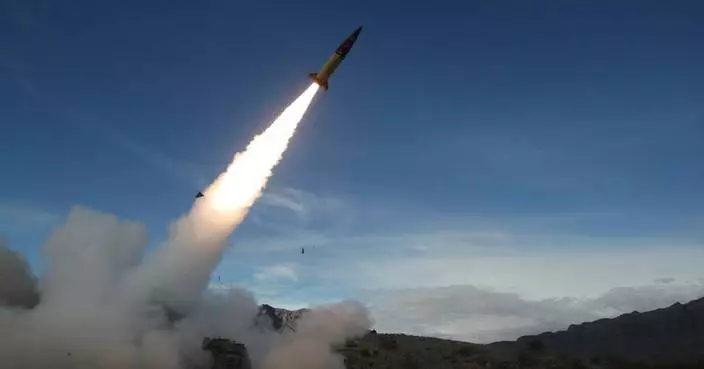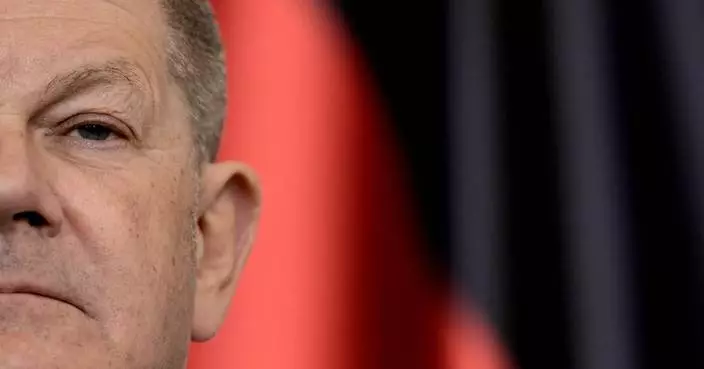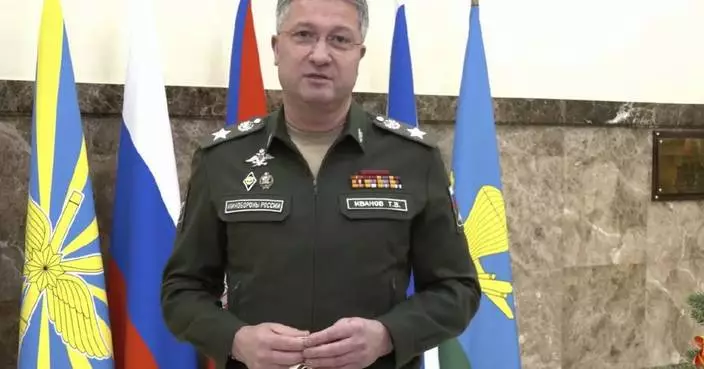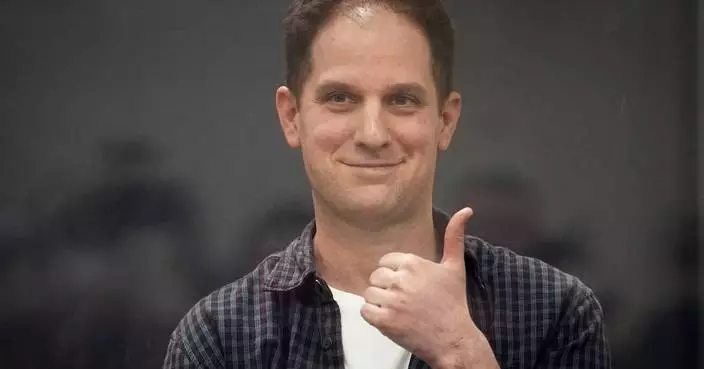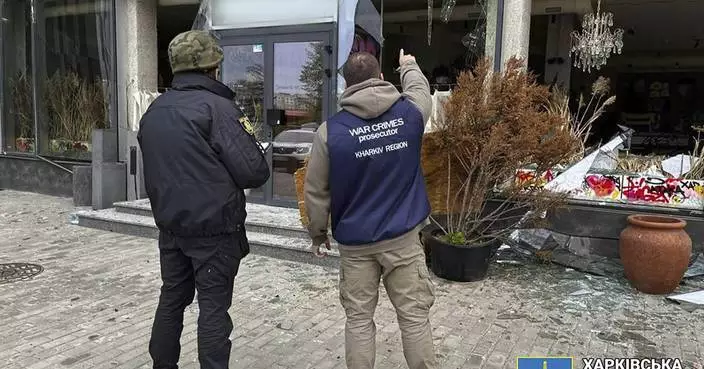Since a former Russian double agent and his daughter were poisoned in Britain a week ago, suspicions about Russia's possible handiwork have run high — except in major Russian news outlets, where fingers point in the other direction.
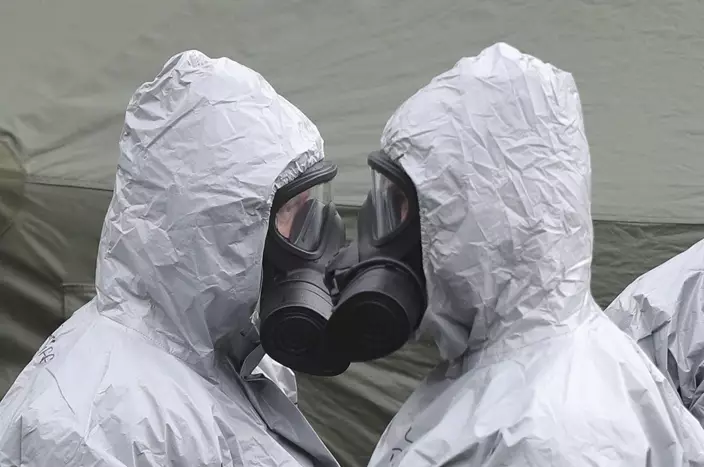
Military personnel in College Street Car Park in Salisbury, Sunday March 11, 2018, as police and members of the armed forces probe the suspected nerve agent attack on Russian double agent Sergei Skripal, which took place on Sunday March 4. (Andrew Matthews/PA via AP)
Sergei Skripal, a former officer in Russia's military intelligence service GRU who was convicted in Russia of spying for Britain, and his adult daughter were found comatose on March 4 in the English town of Salisbury, where he lived after being freed in a 2010 spy swap.
Click to Gallery
Since a former Russian double agent and his daughter were poisoned in Britain a week ago, suspicions about Russia's possible handiwork have run high — except in major Russian news outlets, where fingers point in the other direction.
Sergei Skripal, a former officer in Russia's military intelligence service GRU who was convicted in Russia of spying for Britain, and his adult daughter were found comatose on March 4 in the English town of Salisbury, where he lived after being freed in a 2010 spy swap.
The British motive? "Simply in order to feed their Russophobia," Kiselev posited.
Komsomolskaya Pravda struck an almost facetious tone in the story.
On Sunday, Kiselev suggested a possible connection between the poisonings in Salisbury, which British officials said resulted from exposure to an unspecified nerve agent, and international soccer's upcoming World Cup tournament. Russia winning the right to host the competition that runs from mid-June until mid-July is one of the accomplishments Putin can point to in his re-election campaign.
"But in the British press and special services, there is no suspicion" of any British involvement, said reporter Alexander Khabarov.
While in the West, suspicions about who could be responsible have landed on Russia, in that country the response has been very different.
"If you think about it, well, the only ones for whom the poisoning of the ex-GRU colonel is advantageous are the British," Dimtry Kiselev, one of Russia's most powerful media figures, said during his Sunday news program.
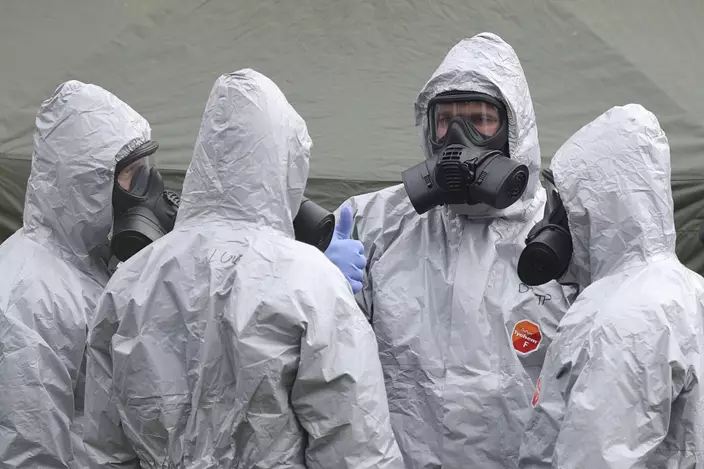
Military personnel in College Street Car Park in Salisbury, Sunday March 11, 2018, as police and members of the armed forces probe the suspected nerve agent attack on Russian double agent Sergei Skripal, which took place on Sunday March 4. (Andrew Matthews/PA via AP)
The British motive? "Simply in order to feed their Russophobia," Kiselev posited.
Kiselev's weekly show on state-owned TV channel Rossiya-1, a mixture of admiring coverage of President Vladimir Putin and insinuations of Western deviousness and incompetence, is regarded here primarily as a voice of the Kremlin.
His segment about Skripal was in sync with a reflexive response of Russian officials to attribute nearly all criticism from the West to anti-Russia bias. The sense of Russia as the target of prejudice that unscrupulous politicians work to cultivate is a key element of Putin's popularity as he seeks a fourth term in a March 4 election.
Former special services agent Mikhail Lyubimov was quoted in Komsomolskaya Pravda, one of Russia's most popular newspapers, as suggesting Skripal wouldn't have been worth the trouble of a hit.
"Skripal was sent to the West in a swap; that means he's absolutely uninteresting to us. He's a small-fry," Lyubimov said.
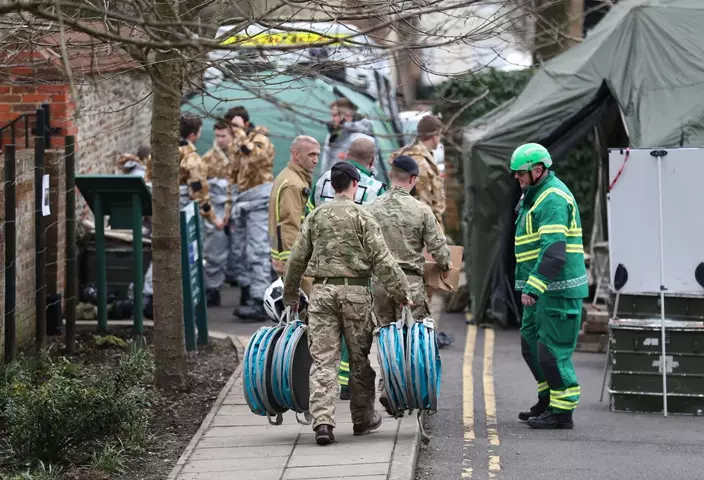
Military and emergency services personnel outside Bourne Hill police station in Salisbury, England, as police and members of the armed forces probe the suspected nerve agent attack on Russian double agent spy Sergei Skripal, Sunday March 11, 2018. (Andrew Matthews/PA via AP)
Komsomolskaya Pravda struck an almost facetious tone in the story.
"In Foggy Albion, the latest spy scandal with anti-Russian tones has ripened," it began. The article included a colorful Russian idiom for unfair accusations in a line that read, "It's obvious that, following the old tradition, all dogs will be hung on Moscow."
Russian media aimed at foreign readers have adopted the same tone of resentment and mockery as news outlets for domestic audiences.
"The British are well-known for their dramatic flair when it comes to stories of Cold War espionage and murder mystery. Think Ian Fleming, John Le Carre and Agatha Christie," said a commentary on Sputnik News, a state-run English-language news site.
"But this week's episode of a former Russian spy being poisoned on a public park bench in a quaint English town has suspiciously a tad too much drama about it."
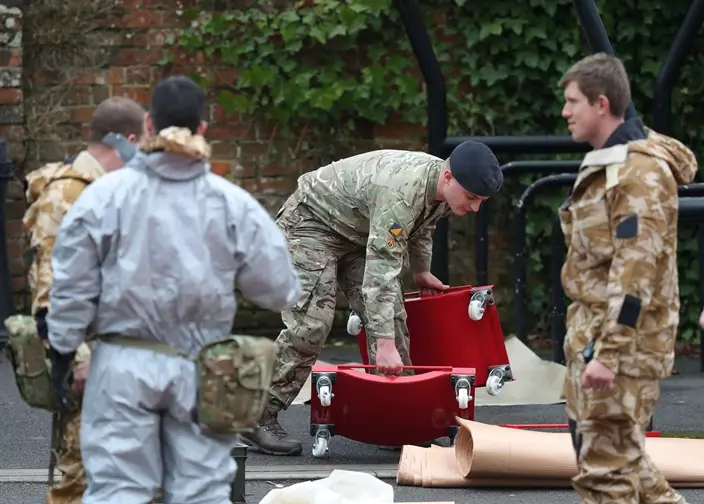
Military personnel outside Bourne Hill police station in Salisbury, England, as police and members of the armed forces probe the suspected nerve agent attack on Russian double agent spy Sergei Skripal, Sunday March 11, 2018. (Andrew Matthews/PA via AP)
On Sunday, Kiselev suggested a possible connection between the poisonings in Salisbury, which British officials said resulted from exposure to an unspecified nerve agent, and international soccer's upcoming World Cup tournament. Russia winning the right to host the competition that runs from mid-June until mid-July is one of the accomplishments Putin can point to in his re-election campaign.
Kiselev suggested the poisoning could be a "special operation" aimed at justifying a boycott of the tournament.
Skripal wasn't much use to Britain as an exposed ex-spy, but "as someone who's been poisoned, who is ill, he's very useful," Kiselev said.
The program included an on-the-ground report from Britain. The reporter noted that Salisbury, the town where Skripal was lived and fell sick, is about a 20-minute drive from the Porton Down laboratories where Britain developed chemical and bacteriological agents.
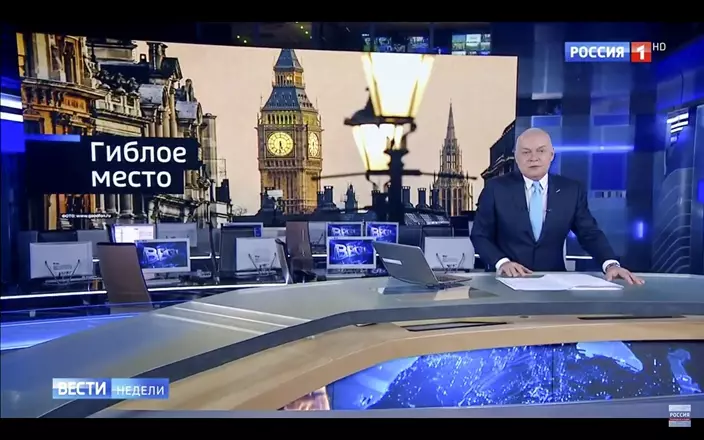
In this video grab provided by RU-RTR Russian television on Sunday, March 11, 2018, Dimtry Kiselev, one of Russia's most powerful media figures, speaks during his Sunday news program on state-owned TV channel Rossiya-1, in Moscow, Russia. (RU-RTR Russian Television via AP)
"But in the British press and special services, there is no suspicion" of any British involvement, said reporter Alexander Khabarov.
On another state television station, Channel One, anchorman Kirill Klemeinov began a report on the case balefully. He had a public service warning, Klemeinov said, for anyone who dreamed of a career that followed in Skripal's footsteps.
"The profession of a traitor is one of the most dangerous in the world," he said. "It's very rare that those who chose it have lived in peace until a ripe old age.
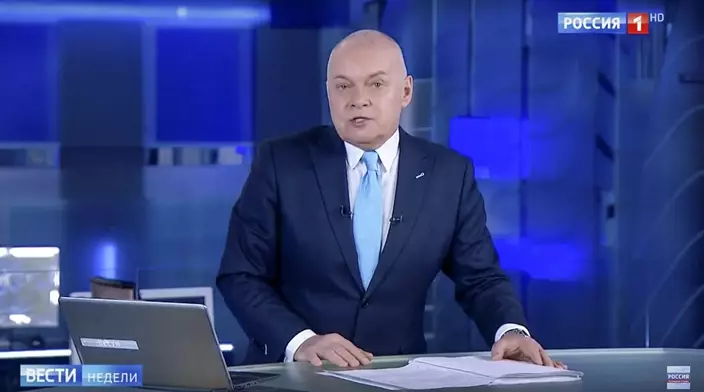
In this video grab provided by RU-RTR Russian television on Sunday, March 11, 2018, Dimtry Kiselev, one of Russia's most powerful media figures, speaks during his Sunday news program on state-owned TV channel Rossiya-1, in Moscow, Russia.(RU-RTR Russian Television via AP)
"Alcoholism, drug addiction, stress and depression are inevitable professional illnesses of a traitor, resulting in heart attacks and even suicide," Klemeinov said.
UNITED NATIONS (AP) — Russia on Wednesday vetoed a U.N. resolution sponsored by the United States and Japan calling on all nations to prevent a dangerous nuclear arms race in outer space, calling it “a dirty spectacle” that cherry picks weapons of mass destruction from all other weapons that should also be banned.
The vote in the 15-member Security Council was 13 in favor, Russia opposed and China abstaining.
The resolution would have called on all countries not to develop or deploy nuclear arms or other weapons of mass destruction in space, as banned under a 1967 international treaty that included the U.S. and Russia, and to agree to the need to verify compliance.
U.S. Ambassador Linda Thomas-Greenfield said after the vote that Russian President Vladimir Putin has said Moscow has no intention of deploying nuclear weapons in space.
“Today’s veto begs the question: Why? Why, if you are following the rules, would you not support a resolution that reaffirms them? What could you possibly be hiding,” she asked. “It’s baffling. And it’s a shame.”
Russia’s U.N. Ambassador Vassily Nebenzia dismissed the resolution as “absolutely absurd and politicized,” and said it didn’t go far enough in banning all types of weapons in space.
Russia and China proposed an amendment to the U.S.-Japan draft that would call on all countries, especially those with major space capabilities, “to prevent for all time the placement of weapons in outer space, and the threat of use of force in outer spaces.”
The vote was 7 countries in favor, 7 against, and one abstention and the amendment was defeated because it failed to get the minimum 9 “yes” votes required for adoption.
The U.S. opposed the amendment, and after the vote Nebenzia addressed the U.S. ambassador saying: “We want a ban on the placement of weapons of any kind in outer space, not just WMDs (weapons of mass destruction). But you don’t want that. And let me ask you that very same question. Why?”
He said much of the U.S. and Japan’s actions become clear “if we recall that the U.S. and their allies announced some time ago plans to place weapons … in outer space.”
Nebenzia accused the U.S. of blocking a Russian-Chinese proposal since 2008 for a treaty against putting weapons in outer space.
Thomas-Greenfield accused Russia of undermining global treaties to prevent the spread of nuclear weapons, irresponsibly invoking “dangerous nuclear rhetoric,” walking away from several of its arms control obligations, and refusing to engage “in substantive discussions around arms control or risk reduction.”
She called Wednesday’s vote “a real missed opportunity to rebuild much-needed trust in existing arms control obligations.”
Thomas-Greenfield’s announcement of the resolution on March 18 followed White House confirmation in February that Russia has obtained a “troubling” anti-satellite weapon capability, although such a weapon is not operational yet.
Putin declared later that Moscow has no intention of deploying nuclear weapons in space, claiming that the country has only developed space capabilities similar to those of the U.S.
Thomas-Greenfield said before the vote that the world is just beginning to understand “the catastrophic ramifications of a nuclear explosion in space.”
It could destroy “thousands of satellites operated by countries and companies around the world — and wipe out the vital communications, scientific, meteorological, agricultural, commercial, and national security services we all depend on,” she said.
The defeated draft resolution said “the prevention of an arms race in outer space would avert a grave danger for international peace and security.” It would have urged all countries carrying out activities in exploring and using outer space to comply with international law and the U.N. Charter.
The draft would have affirmed that countries that ratified the 1967 Outer Space Treaty must comply with their obligations not to put in orbit around the Earth “any objects” with weapons of mass destruction, or install them “on celestial bodies, or station such weapons in outer space.”
The treaty, ratified by some 114 countries, including the U.S. and Russia, prohibits the deployment of “nuclear weapons or any other kinds of weapons of mass destruction” in orbit or the stationing of “weapons in outer space in any other manner.”
The draft resolution emphasized “the necessity of further measures, including political commitments and legally binding instruments, with appropriate and effective provisions for verification, to prevent an arms race in outer space in all its aspects.”
It reiterated that the U.N. Conference on Disarmament, based in Geneva, has the primary responsibility to negotiate agreements on preventing an arms race in outer space.
The 65-nation body has achieved few results and has largely devolved into a venue for countries to voice criticism of others’ weapons programs or defend their own. The draft resolution would have urged the conference “to adopt and implement a balanced and comprehensive program of work.”
At the March council meeting where the U.S.-Japan initiative was launched, U.N. Secretary-General António Guterres warned that “geopolitical tensions and mistrust have escalated the risk of nuclear warfare to its highest point in decades.”
He said the movie “Oppenheimer” about Robert Oppenheimer, who directed the U.S. project during World War II that developed the atomic bomb, “brought the harsh reality of nuclear doomsday to vivid life for millions around the world.”
“Humanity cannot survive a sequel to Oppenheimer,” the U.N. chief said.

United States Ambassador and Representative to the United Nations Linda Thomas-Greenfield addresses members of the U.N. Security Council before voting during a meeting on Non-proliferation of nuclear weapons, Wednesday, April 24, 2024 at United Nations headquarters. (AP Photo/Eduardo Munoz Alvarez)

FILE - U.S. Ambassador to United Nations Linda Thomas-Greenfield speaks on Thursday, April 18, 2024, in Tokyo. The U.N. Security Council is set to vote Wednesday, April 24, 2024, on a resolution announced by Thomas-Greenfield, calling on all nations to prevent a dangerous nuclear arms race in outer space. It is likely to be vetoed by Russia. (AP Photo/Eugene Hoshiko, Pool, File)











